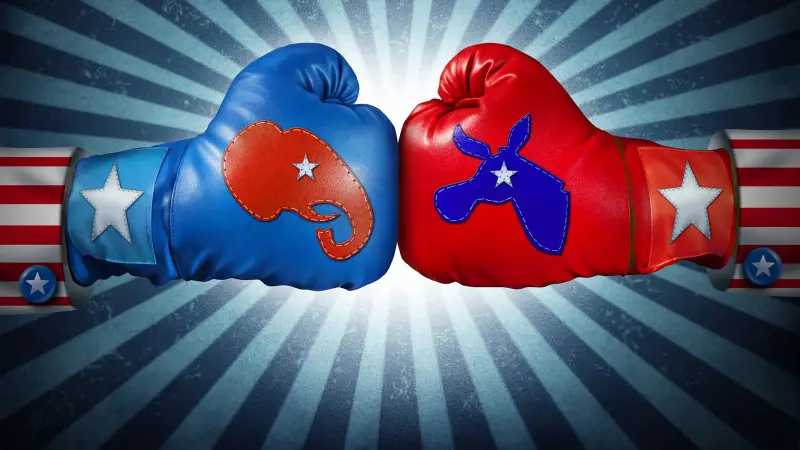A Chip off the Old Voting Bloc
It’s important to avoid blindly rejecting or accepting your family’s political stance. Your country depends on it.
By Lauren Grimaldi, Roosevelt University
Families fight about a lot of things, especially politics.
As you grow up, your parents and family teach you nearly everything. But when it comes to political identity, it’s important that you develop your own ideological consciousness, which means neither blindly rejecting or accepting the opinions of your family as truth.
Of course, everyone wants to believe that their parents’ way is the right way. You grow up thinking that the people who raised you are perfect, and that you can learn everything you need from them.
For most people, political conscience is dually developed in school and at home. While at home, you’ll hear about what your parents think is right and naturally start to believe the same. As adolescence and the awful years of being a teenager arrive though, so does your sense of individuality. Then with later adolescence comes the ability to better understand complex issues. Around this period in life, children begin to experiment with viewpoints different from or opposite than those of their parents.
 In addition to the natural desire to rebel ideologically, some differences in opinion will come as the result of generational gaps. Older people tend to vote conservatively, whereas college students almost always vote liberally. This voting trend is not limited to the 21st century either—the disparity in political beliefs across age groups has always existed.
In addition to the natural desire to rebel ideologically, some differences in opinion will come as the result of generational gaps. Older people tend to vote conservatively, whereas college students almost always vote liberally. This voting trend is not limited to the 21st century either—the disparity in political beliefs across age groups has always existed.
Exactly what causes young people to want to rejects their parents’ viewpoints will probably never be fully understood, but it remains that we cannot form our political identities (or any other sense of self for that matter) just because we do not want to be clones of our parents. Still, because young people form their beliefs based off of how they were raised, a tricky dynamic ensues that necessitates that political convictions must be created autonomously, as neither a full acceptance or rejection of one’s upbringing and community values.
Everyone loves to think that they’re right. So, when your convictions are challenged, the natural inclination is defensiveness. This sense of embattlement can grow even more acute when political beliefs are attacked. And as the divisive gridlock in Congress proves, politics can divide us more than anything.
Just like on Capitol Hill, ideological intractability can plague family units as well. The oft-mentioned “crazy uncle” ruining Thanksgiving with his offensive comments is no urban legend, but rather a fixture of familial political discourse.
Far from negative, however, the existence of political heterogeneity in families is integral to our own formation of identity. A political conscience developed in a vacuum is going to be helplessly one-sided, so conflicting views actually sharpen and strengthen belief, not weaken it.
As a result, while it may be easier to just politically mimic your parents, the ever-changing moral compass of society needs input from younger generations, which necessitates that students and new voters think for themselves.
Our elections have the best results when they accurately represent the opinion of the youth. When young people vote, they vote because they are inspired by candidates that they feel will give them a better future. While families are also concerned with the country’s direction, their antiquated value systems can impede meaningful—but new and startling—social change.
So how can you begin to develop your political identity independent of your parents and family?
It may sound ridiculous, but I found my own political outlook from comedy and satire, specifically “The Daily Show” with Jon Stewart. Stewart’s voice is sorely missed in the discourse surrounding the insane 2016 election, but anyone who dislikes politics would still benefit from tuning in to the show’s new iteration under Trevor Noah.
I began watching “The Daily Show” religiously my freshman year of high school. At the same time, I was also a huge fan of Stephen Colbert and “The Colbert Report.” While Mr. Colbert has obviously gone on to bigger and better things, his new show still showcases political happenings in humorous and accessible ways.
Not only did these shows make me laugh, they also informed me politically, which helped me develop my political identity. So instead of rebelling against my family’s views or trying to fit in with my peers, I simply educated myself and deduced from that what it is that I believe in.
This interest led me to reading more about politics from news organizations such as “Politico,” “The Washington Post,” and “The New York Times,” culminating in my pursuit of a political science major in college. I am not trying to push political science, just saying that educating yourself on politics through appealing means, along with reading articles from different new outlets, might lead you to discover your love for the subject, and will certainly make you a more educated person overall.
Though generational discord will continue to make Thanksgiving uncomfortable, discounting your relatives with colorful political views only disservices you. Sure, engaging in debate with them will be enraging, but it will also help you argue your own positions better. The secret prize of political dissent within families is that it develops you as an arguer, which enhances your ability to vocalize and promote your opinions. The real world is filled with people who are going to disagree with you, so practicing with familial dissent will only help you survive those future conflicts.
So, as Election Day draws closer, educate yourself on what is at stake—separately from what your parents if necessary. Rather than becoming a carbon copy of your family, make sure you’re able to fend for yourself politically in order to avoid under-developing a vital component of your identity.

















